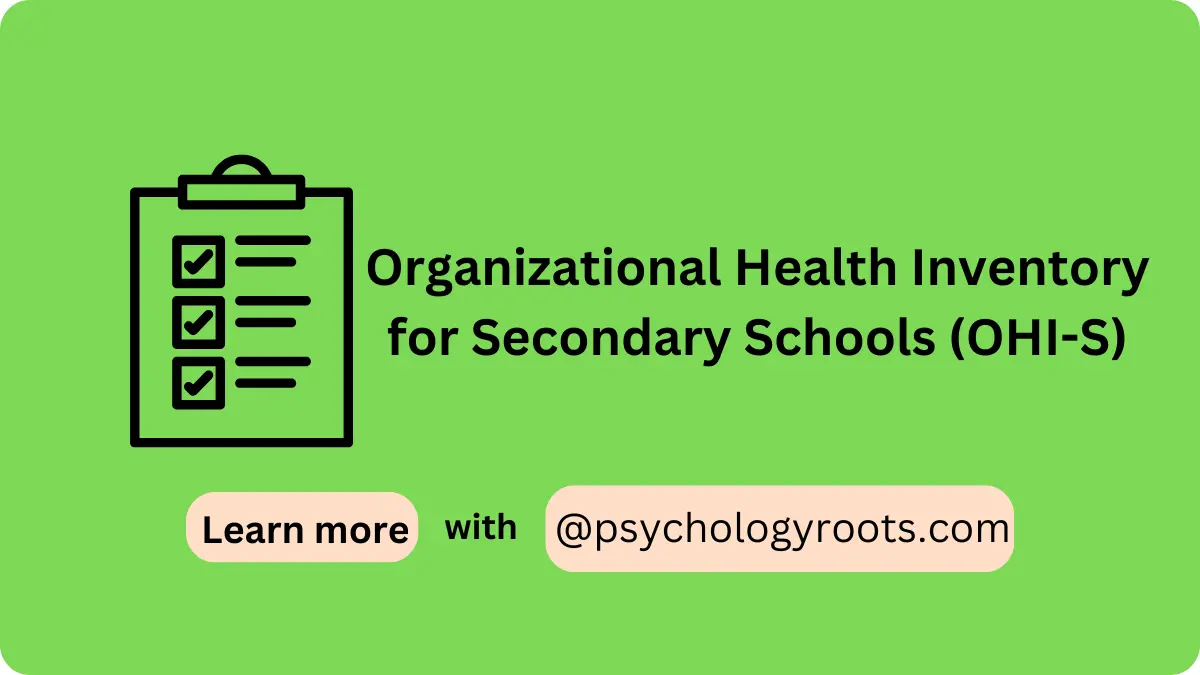Table of Contents
Organizational Health Inventory for Secondary Schools (OHI-S)
Here in this post, we are sharing the “Organizational Health Inventory for Secondary Schools (OHI-S)”. You can read psychometric and Author information. We have thousands of Scales and questionnaires in our collection (See Scales and Questionnaires). You can demand us any scale and questionnaires related to psychology through our community, and we will provide you with a short time. Keep visiting Psychology Roots.
About Organizational Health Inventory for Secondary Schools (OHI-S)
Scale Name
Organizational Health Inventory for Secondary Schools (OHI-S)
Author Details
Feldman & Hoy
Translation Availability
English

Background/Description
The Organizational Health Inventory for Secondary Schools (OHI-S) is a validated tool specifically designed to evaluate the health and functionality of secondary schools. Developed by Hoy and colleagues, the instrument assesses the overall organizational climate by measuring various dimensions that contribute to a school’s ability to function effectively, adapt to challenges, and sustain a positive educational environment.
The OHI-S framework is based on the concept of “organizational health,” which includes the school’s capacity to manage external demands, internal processes, and the social and emotional well-being of its members. The inventory consists of a set of items that capture teachers’ perceptions of the organizational dynamics within their schools.
The OHI-S provides valuable insights for administrators, educators, and policymakers seeking to foster a more open, healthy, and productive school climate.
Administration, Scoring and Interpretation
- Obtain the Inventory: Ensure access to the Organizational Health Inventory for Secondary Schools (OHI-S).
- Define the Purpose: Communicate the aim of assessing organizational health to participants.
- Provide Clear Instructions:
- Items are rated on a Likert scale (e.g., strongly disagree to strongly agree).
- Responses are anonymous to ensure honesty.
- Distribute the Inventory: Administer the inventory to teaching staff and other relevant stakeholders.
Reliability and Validity
- Consistently demonstrated high internal consistency with Cronbach’s alpha values above .80.
- Strong construct validity established through factor analyses and correlations with student outcomes and teacher satisfaction.
- Frequently used in educational research to evaluate school climates and organizational dynamics.
Available Versions
44-Items
Reference
Hoy, W. K., Tarter, C. J., & Kottkamp, R. B. (1991). Open schools/healthy schools: Measuring organizational climate. Beverly Hills, CA: Sage.
Hoy, W. K., & Tarter, C. J. (1997). The road to open and healthy schools: A handbook for change. (No Title).
Important Link
Scale File:
Frequently Asked Questions
What does the OHI-S measure?
It measures key dimensions of organizational health in secondary schools, such as institutional integrity, morale, and academic emphasis.
Who should complete the OHI-S?
Secondary school teaching staff and administrators.
How many items does the OHI-S include?
The number of items varies slightly depending on the version but is typically comprehensive and multidimensional.
What is the response format?
A Likert scale ranging from strongly disagree to strongly agree.
Can the OHI-S guide school improvement strategies?
Yes, results can highlight areas for targeted interventions to improve school climate and organizational health.
Disclaimer
Please note that Psychology Roots does not have the right to grant permission for the use of any psychological scales or assessments listed on its website. To use any scale or assessment, you must obtain permission directly from the author or translator of the tool. Psychology Roots provides information about various tools and their administration procedures, but it is your responsibility to obtain proper permissions before using any scale or assessment. If you need further information about an author’s contact details, please submit a query to the Psychology Roots team.
Help Us Improve This Article
Have you discovered an inaccuracy? We put out great effort to give accurate and scientifically trustworthy information to our readers. Please notify us if you discover any typographical or grammatical errors.
Make a comment. We acknowledge and appreciate your efforts.
Share With Us
If you have any scale or any material related to psychology kindly share it with us at psychologyroots@gmail.com. We help others on behalf of you.